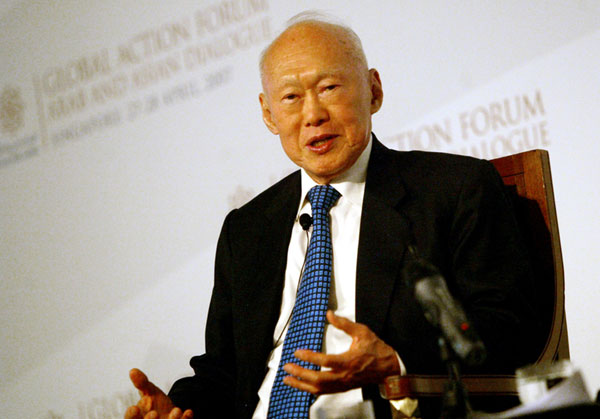Singapore former PM Lee Kuan Yew passes away
Updated: 2015-03-23 04:47
By Zhang Yunbi(chinadaily.com.cn)
|
|||||||||||
 |
|
Singapore's Minister Mentor Lee Kuan Yew speaks to the audience during the Arab and Asian dialogue in Singapore April 27, 2007.[Photo/IC] |
Political legacy
Lee Kuan Yew, as the founding father of Singapore, left abundant political legacies behind, from which this Southeastern Asian country is still benefit.
Attaching much importance to legislation
One of the major ruling concepts promoted by Leeis legislation, to which he attached much importance. He believed that legislation provides the basic framework for social stability and development.
He thought that law needs to demonstrate humanity and respect people's rights, however law also should limit abuse of power, which will lead to the falling apart of the social order. One of Lee's abiding beliefs has been in the efficacy of corporal punishment in the form of caning.
Promoting economic development
Lee encouraged innovation and opening to the outside world. He said that the quality of a nation's manpower resources is the single most important factor determining national competitiveness. It is the people's innovativeness, entrepreneurship, team work, and their work ethic that gives them that sharp keen edge in competitiveness.
Under his ruling, the implementation of internationalized economic polices has made Singapore one of the most important manufacturing bases of export and import.
He promoted development of infrastructure and forged Singapore into an oasis of development. Singapore also makes full use of the advantages of being a port of reshipment and provides international and authorized financial service.
Emphasizing importance of knowledge
Lee set English as Singapore's first official language and Chinese as the second to let people form an English thought pattern. He emphasizes the importance of knowledge in economic transformation but also rejects the classical separation between scholarship and entrepreneurship.
"Those with good minds to be scholars should also be inventors, innovators, venture capitalists, and entrepreneurs; they must bring new products and services to the market to enrich the lives of people everywhere," he said.
Related Stories
Singapore's Minister Mentor Lee Kuan Yew 2006-05-25 16:54
Lee Kuan Yew's political legacy 2015-03-23 04:34
Lee Kuan Yew and his Chinese connections 2015-03-23 04:34
Lee Kuan Yew and art of diplomacy 2015-03-23 04:34
Lee Kuan Yew: Singapore must take advantage of globalization 2007-04-22 21:39
Today's Top News
Singapore's Lee remembered as 'old friend' of China
ChemChina to buy tire maker Pirelli
German-Chinese play looks at individuals in the collective
Funding of China-backed bank will be open to other countries
Mummified Buddha stolen from China: government
Russia, China to uphold WWII history
Sanctions linked to Minsk deal implementation: EU
Australia to invest A$3b in AIIB
Hot Topics
Lunar probe , China growth forecasts, Emission rules get tougher, China seen through 'colored lens', International board,
Editor's Picks

|

|

|

|

|

|





